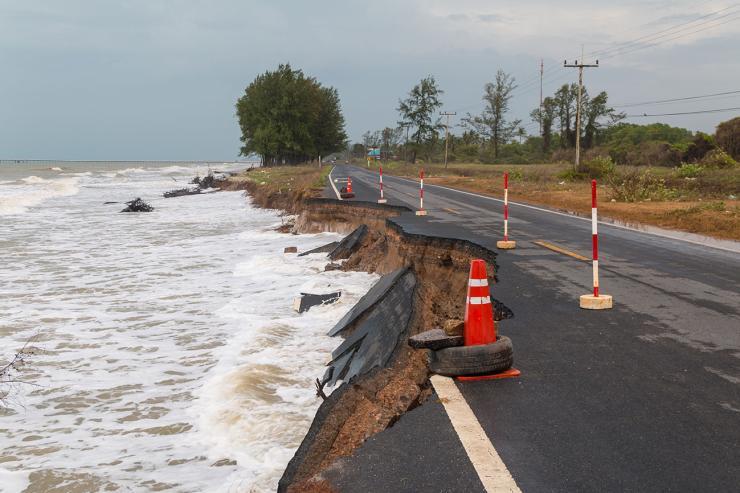Georgia Sea Level Research and Resilience Efforts Expand
Oct 05, 2022 — Atlanta, GA

Coastal Erosion
A National Oceanic and Atmospheric Administration (NOAA) project funded by the National Centers for Coastal Ocean Science has officially started September 2022 and is projected to be completed in August 2027. The project is led by Georgia Tech scientists and engineers working to aid in emergency planning and response during episodes of flooding along Georgia’s coast.
This coastal infrastructure and resilience research initiative is called the Georgia Coastal Equity and Resilience (CEAR) Hub. This new phase of research follows the successful efforts of Georgia Tech’s smart sea level sensors research which was a partnership between Chatham county emergency management agency officials, city of Savannah officials, and Georgia Tech scientists and engineers who have been working together for years to install a network of wireless, internet-enabled sea level sensors in key coastal areas.
The new Climate Equity and Resilience Hub aims to advance transformative and inclusive resilience tools that address systemic barriers and enhance equitable access to resources and opportunities. The Hub will promote the resilience and sustainability of vulnerable and marginalized Georgia coastal communities through integrative community-driven research, education, training, and outreach to produce equitable, evidence-based, scalable solutions to challenges related to flooding and sea level rise.
Russell J. Clark, senior research scientist in the School of Computer Science at Georgia Tech’s College of Computing, is leading the project. Clark is also a faculty member in the Institute of People and Technology at Georgia Tech. Allen Hyde, assistant professor in the School of History and Sociology in Georgia Tech’s Ivan Allen College of Liberal Arts, will lead a National Science Foundation project focused on youth disaster resilience as part of the effort.
Why We Care
Increasingly frequent floods along the Georgia coast have exposed the acute vulnerabilities of low-income and historically underserved residents to the growing threats of sea level rise (SLR), storm surge, and extreme precipitation under continued climate change. These threats often create severe localized flooding that impacts vulnerable communities and further exacerbates existing inequalities. Communities can benefit from frameworks for transdisciplinary research that integrate knowledge and data streams across social, ecological, and environmental dimensions and advance the design and implementation of evidence-based solutions for coastal resilience.
What We Are Doing
The Community-Direct Spending (CDS) funding for a Coastal Infrastructure and Resilience Research Initiative support the establishment of a Climate Equity and Resilience Hub that promotes the resilience and sustainability of vulnerable and marginalized Georgia coastal communities through integrative community-driven research, education, training, and outreach to produce equitable, evidence-based, scalable solutions to challenges related to flooding and sea level rise.
The Hub has three primary objectives: 1) Establish a Stakeholder Decision Support System that combines a hyper-local water level observing sensor network and a coastal modeling system to provide real-time high-resolution and high-frequency flood data that coastal communities can use to plan for and respond to flood emergencies and design resilience and adaptation strategies for the long-term effects of projected flooding and sea-level rise; 2) to develop a Community Support and Engagement Strategy that includes partnerships with the following organizations: City of Savannah, Chatham County Emergency Management Agency, The Harambee House Citizens for Environmental Justice, Pin Point Betterment Association, Coastal Georgia Indicators Coalition, Tybee Marine Science Center, Savannah-Chatham County schools; 3) Bolster community capacity for engagement in coastal resilience research and planning activities through the development of enhanced K-12 programming and targeted workforce development.
Primary contact(s) for the project: russ.clark@gatech.edu; brittany.king@noaa.gov
Read NOAA’s official kickoff announcement for CEAR >>
Past article: With Recent Funding, Sea Level Sensor Project in Savannah Moves into New Phase




